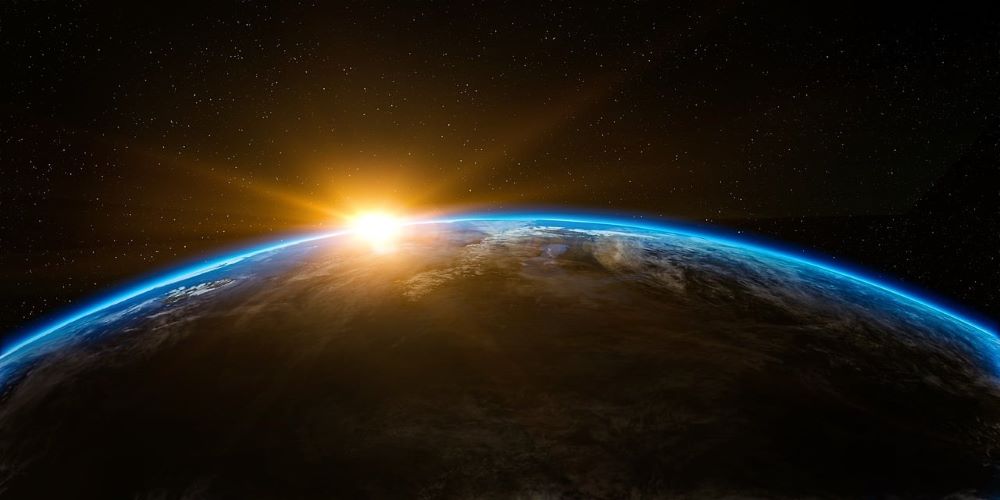
Possibilities open up when we think about the warming Earth with love, not fear, says Rabbi Ellen Bernstein, founder of Shomrei Adamah, the first national Jewish environmental organization, and author of the forthcoming book "Toward a Holy Ecology." (Pixabay/Arek Socha)
I have long thought that the climate crisis was a spiritual crisis, a crisis in how we think about the world and what we value. It's a reflection of a fundamental breakdown in the way we treat each other and the Earth. Our religious traditions must take responsibility for helping us navigate the troubled waters we are facing.
When we dig more deeply into our religious roots, we find ancient wisdom that can draw us closer to God's green Earth, cultivate in us a generosity toward all beings and steer us on paths of justice and righteousness that will ensure a healthy future for the Earth and all of us.
In my own tradition right now we are observing the Days of Awe — the sacred period that begins with the Jewish New Year, Rosh Hashana, the day that the Earth and all the creatures were born. Each year at this time, we and the whole creation are renewed. The language of awe and renewal we use at Rosh Hashana helps to tune me into the Earth and its seasons: the trees communicating with each other through vast mycelial networks, the planets running their circuits in the sky, the very miracle that I am a breathing, pulsating being in this body speaking to you all.
The Hebrew word for awe, Yira, also carries the meaning of fear, dread, terror. And indeed, this is true of the English word awe — when you consider the word aw-ful. The space between awe and fear is thin indeed. This combination of awe and fear is my natural state these days. I'm simultaneously awed by the connectedness that underlies all life and terrified by the imminent possibilities of destruction when those connections break down.
It's amazing when you think about how the archaic fossil fuels — decomposed plants and dinosaurs hundreds of millions of years old that those of us in the Global North particularly use to power our cars — yield so much carbon dioxide that we are overheating our precious life-sustaining atmosphere, drying out the Earth, creating deserts throughout the world, deeming habitats uninhabitable. We are contributing to forest and grass fires, displacing or wiping out whole communities, not to mention the creatures and entire ecosystems. I am awed and terrified by the damage we have wrought.
Advertisement
This week I was honored to participate in an international conference on women, faith and climate, Faith in Her, organized by an interfaith coalition, convened by the Muslim World League, called Faith for Our Planet. I'm inspired by the opportunities that a conference particularly oriented toward women can bring to the climate crisis. Women have a special aptitude for nurturing relationship and communities and paying attention to the body and its intuitive wisdom.
In Hebrew, the word for compassion, Rachamim, is rooted in the word rechem or womb; in Aramaic, rechem means love. It is as if the rechem, the womb of the female body, is the source of compassion and love. There is nothing we need more at this time.
Though many people recognize that we are faced with an existential crisis and even understand the science behind the crisis, many have still not found ways to meaningfully participate in the healing of our Earth. While some assume that the scientists and the technocrats or politicians will manage the situation, others are just too overwhelmed by the sense of gloom to do anything at all.
If, instead, we approach the climate crisis from the place of love, a spiritual perspective, a woman's perspective — a perspective that honors the Earth's body, its biodiversity and its own healing capacity — many more possibilities open up.
We can see the possibility of using traditional and Indigenous farming and forestry methods to help sequester carbon in the ground. We can see that growing our own foods in community gardens, supporting local economies, cultivating tiny forests that help cool sweltering cities, fostering alternative energy and supporting women entrepreneurs are all achievable steps we can take. There are so many life affirming activities that we can engage in that simultaneously help balance carbon in our atmosphere while cultivating our relationships with the natural world and nurturing our local communities.
Today, so many of us but especially young people are frightened and grieving about their future. Participating in embodied, community-oriented projects can help soothe troubled minds and hearts and ease suffering and anxiety that have arisen as a byproduct of the climate crisis.
At Rosh Hashana, the Jewish New Year, Jews greet each other with the words shana tova, a good year. Yet shana also means change, so we could just as well wish each other a good change. The tradition invites us to look inward to consider what we need to change to become the best version of ourselves — better able to meet the challenges of the world — and to change what must be changed in these fraught times.
In this season of new beginnings, we are given an opportunity to do it right. I hope you will join me to take advantage of this propitious moment.







